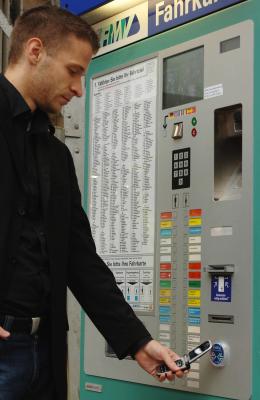German Transit Authorities to Launch Joint NFC Ticketing Service

Frankfurt-based regional transit authority RMV said it plans to launch a joint mobile ticketing service with German national rail operator Deutsche Bahn, which could lead to nationwide NFC-based ticketing.
The two authorities will introduce common touch point for riders to tap with their NFC phones to buy tickets for both local transit and long-distance travel.
Both RMV and Deutsche Bahn have been running NFC pilots for three years or more, which they’ve been planning to expand. With a range of NFC phones now expected on the market later this year, the authorities believe it is time to merge their two e-ticketing systems for passengers to purchase tickets on their mobile phones.
The two authorities will start with a common NFC touch point, which riders will be able to tap to buy tickets over the mobile network. The touch points will based on RMV’s "ConTag," which are NFC tags encased in plastic disks and posted at transit stops.
The common touch points will be installed in RMV and Deutsche Bahn stations in the Frankfurt area. Plans call for expanding the touch points over the next two years to the wider German state of Hesse, said RMV. The joint service is expected to begin in the fall.
RMV coordinates regional and suburban trains, along with metro, bus and tram services provided by transit operators in the Rhine-Main region in Hesse. Ultimately, German transit authorities hope to offer interoperable mobile ticketing nationwide.
RMV began to move toward a rollout of NFC in the Frankfurt area in 2008, as part of RMV’s network-based HandyTicket mobile-ticketing service, which enables customers to buy tickets on their phones.
Riders have been able to tap their NFC phones on any of about 750 RFID ConTag points. This reduces the steps required for buying tickets over the network, though with the paucity of NFC phones, the service is not used often. RMV held a trial in 2007 for the NFC-based HandyTickets and was perhaps the first service provider worldwide to test NFC with a pilot in 2005 in the Frankfurt suburb of Hanau.
Deutsche Bahn began its Touch&Travel NFC trial in February 2008 along with mobile operator Vodafone Germany. Users could tap “touchpoints” to buy tickets for travel between the cities of Berlin and Hanover and also within Berlin and nearby Potsdam.
They used a SIM-based ticketing application but also had to carry conventional paper tickets during the first phase. That ended in December 2008, and with the second phase, a total of 500 trial participants use purely electronic tickets on the SIM cards. Germany's two other major telcos, Deutsche Telekom and Telefónica O2 Germany, joined during the second phase.
Users tap in and tap out on the touchpoints, and the system is designed to automatically calculate their fares and bill the customers. It could debit a preregistered bank account, for example.
Germany has gateless metro and train systems, so riders who buy tickets over the network on their phones do not need to tap the handsets on readers.
RMV said users without NFC phones will be able to tap 2-D bar codes, or QR codes, at stations to buy tickets. The authority last spring launched a six-month trial enabling users to tap either NFC tags or 2-D bar codes to download scheduling updates and information on connections and special offers at nearby restaurants, theaters and other venues, while riding on trains.
German telcos are expected to roll out NFC phones later this year and the transit-ticketing service is expected to be one of the applications. They likely will require the transit application to run on SIM cards they issue
Deutsche Telekom has already announced it will launch its Mobile Wallet program in Germany later this year. NFC Times has reported that the telco along with Vodafone and Telefónica O2 Germany plan to launch their own retail payment service on NFC phones, as well.












